Iva Bittová talks about her two most recent albums – one solo album and one with an orchestra. Although we did discuss things other than music, somehow that’s what we always ended up talking about.
Your last album named Iva Bittová features tracks named Fragment I through XII. How were the fragments created? Did you break something into twelve pieces, or did you take a tiny piece of twelve different things?
This concept was conceived in the recording studio where I offered my material to the producer. Having spent an entire day looking, we decided to go with studio improvisation. I started to record various ideas live, as they were coming, until the producer said we had more than enough. Then we took individual pieces with an integrated idea. The name for the tracks was a spontaneous idea. The respective musical ideas could have been longer but now they are just fragments. The simplest solution was to number them. Had I given names to the moods and atmospheres, it would have been a whole new level of artistic work. They include parts of pieces I have written recently. It is Farewell based on the lyrics by Chris Cuttler on the aging of women, or one based on lyrics by Gertrude Stein. I arranged the latter for a ballet performance in New York. The album contains a fragment of this track.
Now that the album is finished, what is there for the listeners to put together? Are they supposed to complete a puzzle or complete each fragment?
The result is emotive and spontaneous enough. I think we have managed to create an atmosphere that will guide the listener to a certain space, time and mood. It is not always necessary to give names to these moments. However, it is important to find the point of contact and let it guide you. Recording took only two and a half days; it took us back to old times that will be heard in the music.
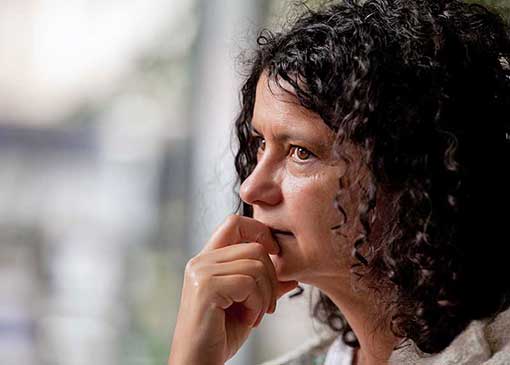 Some critics referred to the recording featuring just your voice and violin as the return to your musical roots. What are your musical roots anyway?
Some critics referred to the recording featuring just your voice and violin as the return to your musical roots. What are your musical roots anyway?
It is a certain view of the world that has been forming throughout my career. I pass it on to listeners who may or may not agree with it. And the rest is there to evaluate, categorise and name it. I do not have to do it.
Why are there twelve fragments? It is intentional, is it supposed to be magical, or is it a pure coincidence?
It was entirely spontaneous. I had a Czech word prepared which I thought could have made a perfect name for the album. The producer decided that the album will be eponymous. The word I had prepared was Hluboko as there were the connections to the old times.
Have you approached ECM or did they come to you?
They came to me. We have been cooperating for several years. Once they released an album with Godár’s Mater, on which I was a guest performer, they said they would like to release my solo album as an introduction to my work. Next year it may be bigger.
ECM releases albums of excellent jazz musicians and its portfolio includes a variety of excellent recordings of 20th century classical music. Was the recording for this label specific in any way?
Our contact and communication has been very close. It was a dialogue that I would like to take to the next level in the course of our cooperation. We have to be clearer as to where the working relationship is going. Manfred Eicher is established and he is respected enough not to have people telling him what needs to be done. It is about understanding and communicativeness.
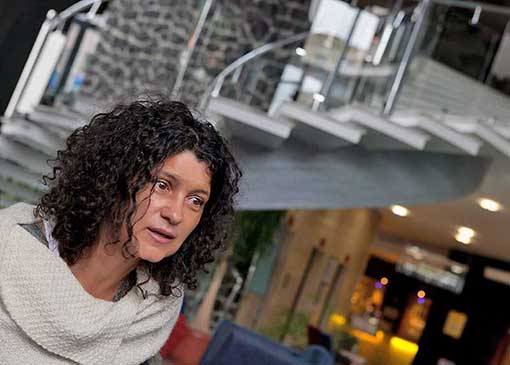 What is it like when you are in a studio where all you do is sing and play the violin. One would think that your kitchen would do the trick…
What is it like when you are in a studio where all you do is sing and play the violin. One would think that your kitchen would do the trick…
It would, and it often does. As for any cooperation with producers, other musicians or directors, there is always a new layer, some vibrations and friction of sorts. They always generate new impetuses. It is like cooking. You are used to certain ingredients, then you add a new one and suddenly something changes. My voice and my violin will always be the foundations of my music, but I also take additional steps forward. I collect experience and learn from cooperation with other people. However, ninety percent of my work is created at home, especially during rehearsals and practicing. It is important for me to live in a calm and quiet environment so that I can remain in close contact with my work, my instrument and my voice. I don’t live in the United States because of the need to be in New York City, but because I need to live in the heart of nature in absolute peace and quiet.
You are sometimes referred to as a multi-genre personality: do you divide music into genres? Is there any point in doing so?
I don’t.
So a violin album with Javas, Elvira in Giovanni, that is all one music?
Yes, all of that is music.
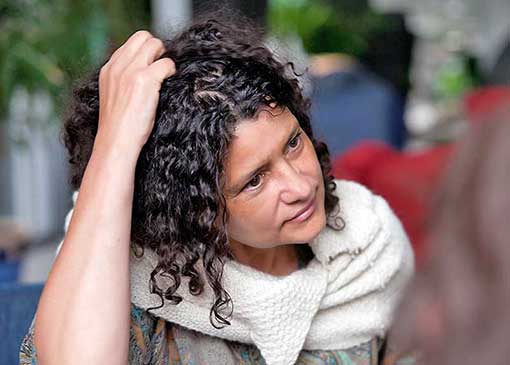 How does one even manage to become famous in the big world? In addition to hard work, do you need to be lucky? And what else?
How does one even manage to become famous in the big world? In addition to hard work, do you need to be lucky? And what else?
It works differently for every artist. And it is different from the situation of businesspersons who have to find their way to global markets. I was lucky to have started my career before 1989 when almost nobody understood my style. I did not have any strong lyrics against the communist regime; all I had was weird music. I could perform all over the world and it was unique enough to attract attention because the word would spread. I started meeting important people, playing at festivals. It was all very fast. It would have been much harder for me to launch my career now. Everything is different, the communication in the age of the Internet is different and everything is about marketing. My career building was spontaneous and I have no recipe to share. Originality plays a key role – if you play music which has deep roots in the respective country, it is tough. You must be able to offer that special something. It requires talent and responsibility towards your talent. You must work on it constantly if you want to keep loyal audiences. My concerts are frequently sold out but I don’t perform in huge projects or stadiums. I am able to perform a good concert in a hall for fewer than four hundred people without sound equipment.
The album Fragmenty seems like the total opposite of your previous album Zvon, featuring the Prague Philharmonia. What made you arrange your earlier work for symphonic performances? (Did this orchestral recording play any role in your “escape” to “chamber sounds”?)
Petr Ostrouchov and I discussed the possibility to have a live concert with an orchestra and Čikori. Several concerts with the philharmonic ensemble took place in Zlín. It gave us the idea to record it in a studio. Beata Hlavenková and I approached the Prague Philharmonia and we recorded an album in the Sono studio. It represents a selection of my works throughout my career. Most of the tracks originally feature only a violin and a guitar. But all of a sudden you can work with a massive sound, which is why you risk ending up with a kitsch piece. The condition was to arrange the songs but, at the same time, ensure the original intimacy. I think we succeeded. The guest performers included Schola Gregoriana and a girls’ choir from Beskydy. Everybody did a great job and I am very happy about the way this recording has turned out. Everybody who listens to it say they can feel the joy of playing, even if they do not understand the lyrics. That is one of the most important things for me, music wise. I am grateful to all people who have worked on this album.
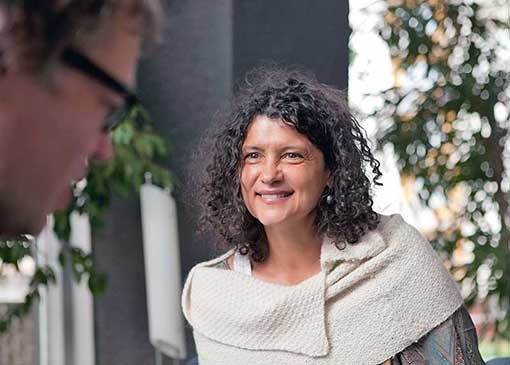 What was it like going through your old songs in order to decide which one of them needs new clothes?
What was it like going through your old songs in order to decide which one of them needs new clothes?
It was a joint effort. However, it was clear from the beginning which songs are suitable for the arrangement and which are not. We did not have any doubts. For example, Uspávanka – which was composed by myself and Vladimír Václavek based on a poem by Jan Skácel for Bílé inferno – is a pseudo-hit but there is something intimately magical about it as well.
Petr Ostrouchov and Beata Hlavenková are responsible for the symphonic arrangement. Was their professional and human approach to this task different in any way?
I think so. And I think listeners will hear it. Beata has the female touch. You can hear in Paraskeva how she plays with sound colours. Petr is more energetic and knows where to use brass instruments. His arrangements for Zelený víneček and Zvon were very good. I was glad to have two people with different approaches involved. The album is more colourful thanks to them.
Your cooperation with Beata Hlavenková was evidently positive. You two even attended the grand opening of the Ottoman Trumpet club in Brno. Do you want to perform together in the future?
We are connected as humans and musicians. We get along very well. We each have our own projects but at the same time we will take every opportunity to cooperate, be it a duet, arrangements or anything else.
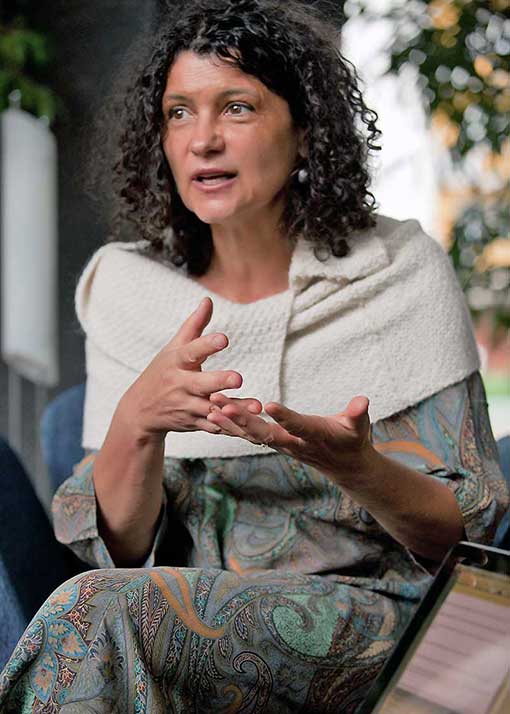 How far along are you with Aleš Březina’s Requiem which is being prepared for the next year?
How far along are you with Aleš Březina’s Requiem which is being prepared for the next year?
I am studying my role but I have not been told the date of the concert yet.
What are your plans for the near future? Any interesting project?
I have many plans. In summer I performed with my American trio Evian. I am preparing a new project with children in Ostrava. I should have a concert tour in Brazil in fall, in cooperation with a local orchestra and several musicians. As for Brno, I will be preparing for the Easter Festival of Sacred Music – I am working on Tenebrae from the Jistebnice hymn book in Czech in cooperation with Vladimír Maňas.
Are you a citizen of Brno, the United States or Lelekovice? Or is your home where you hang your coat?
I need my own space regardless of the address. It needs to be quiet and clean so that I can work without interruptions. I am glad if it is in the heart of nature because I can relax and breathe fresh air. I am a person who wants to be as composed as possible in order to be able to perform anywhere. I try to stay in good shape so that I can handle all the travelling and be prepared for concerts.




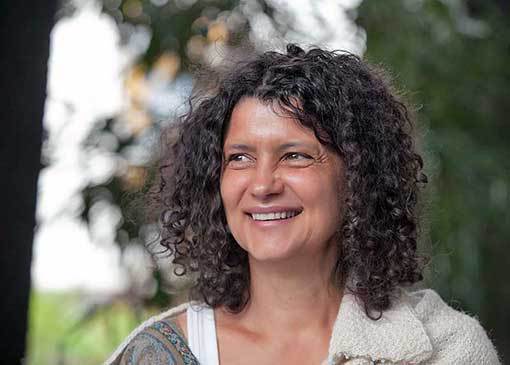



























No comment added yet..